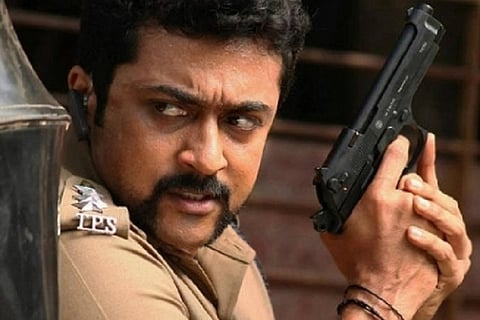

If you've watched enough cop films from the Tamil industry in recent years, you'd have met the supercop. He's the guy who scoffs at human rights and is trigger-happy. We're meant to applaud him because he's never erroneous in his judgment.
Not only are his actions excused, he's glorified for going against the system and killing criminals as long as he feels they deserve it. He's a strong propagator of vigilante justice though he's a cop himself.
In last week's release Nibunan, for instance, the hero (Arjun) copies a serial killer's pattern to eliminate anti-social elements and this is presented to us as a masterstroke that deserves applause. The character Ranjith Kalidoss, we're told, already has a few human rights cases upon him for conducting "encounters" and so, he comes up with this genius method to subvert the system.
In Gautam Menon's cult cop film Khaaka Khaaka, the 'encounter' team comprising Anbuselvan (Suriya) and his mates, deliver instant justice to rowdies and thugs who will supposedly get away because of their powerful connections. The human rights activists who object to their actions are presented to us as a bunch of hypocritical and insensitive jokers who care more about violent perpetrators than their victims.
Vikram (Madhavan) from Vikram Vedha is an "encounter" specialist who is a master at staging a shoot-out scene to make sure the cops are in the clear. And even though an innocent man is killed during one such operation, Vikram is still portrayed in sympathetic light, winning the regard of the villain who is related to the murdered man. All because he is an "honest" cop.
All of these films inevitably have a few lines about how human rights activists are stupid and just don't understand ground reality.
We don't have to go too far to understand why these portrayals are problematic. Visaranai, which was India's nomination for the Academy Awards, tells us just why such supercops who look down upon the human rights framework are not meant to be celebrated.
Pertinently, Visaranai was based on the real life story of a man, Auto Chandran, who was wrongfully arrested and almost became a sacrificial lamb for the cops who were in a hurry to crack the case. In an earlier interview to TNM, Chandran had said, "What you see in the first half of the film about the human rights violations that go on in police custody, is what more or less happened.”
A few other films like Kirumi and Onaayum Aatukuttiyum have also explored the workings of the justice system where cops are neither deified nor presented as absolute evil. Since they are part of the system, they are aware of the loopholes that exist within it. They exploit it to their advantage many a time and these films don't shy away from projecting their reality. But of course, this is possible because the hero in these films isn't a man in khaki.
The National Human Rights Commission (NHRC) has time and again questioned the increasing number of "encounters" by the police in various parts of the country. According to this 2013 report, 555 fake encounters took place in the country between 2009-2013, with 23 cases from Tamil Nadu. Interestingly, of the top 10 states on the list, 5 are states with Naxal presence. There have been many instances when police officers have been accused of staging killings and planting weapons on the dead to justify their murders.
"Instant justice" finds favour with an audience that has very little faith in the tedious justice system. Besides, in the current political climate where nuanced debates have been crushed under the sledgehammer of nationalism, it's near impossible to make a case for why criminals too should have their human rights without being accused of being an "elitist libtard".
The supercop premise works only because we believe unequivocally in the goodness of the hero who drives the film. We believe that he will never turn out to be like the cops from Visaranai. While it may be fine to suspend disbelief and buy this line of argument for the few hours that we're watching the film, it'd be dangerous for the audience to buy into this "pop culture" understanding of human rights and carry with them the scorn for activists who stand up to police brutality.
In films where the hero is not a cop but is targeted by one, filmmakers don't foray much into the human rights narrative because taking refuge in the law doesn't offer as much spectacle as the hero punching back as good as he gets. Getting saved by a jolna wearing human rights activist doesn't make for exciting cinema, after all.
The 'supercop' is becoming popular in other industries, too. For instance, Action Hero Biju had Nivin Pauly take a jibe at human rights activists and in Bollywood, films like Mom have a cop backing a vigilante because the justice system has failed.
Capitalizing on the populist sentiment also makes life easier for the filmmaker who may not be equipped or inclined to traverse the exhausting corridors of the justice system. However, as viewers and members of the public, it is necessary for us to recognise that while "encounters" may create whistle-worthy moments in cinema, they need to be condemned in real life where things are never so black and white.